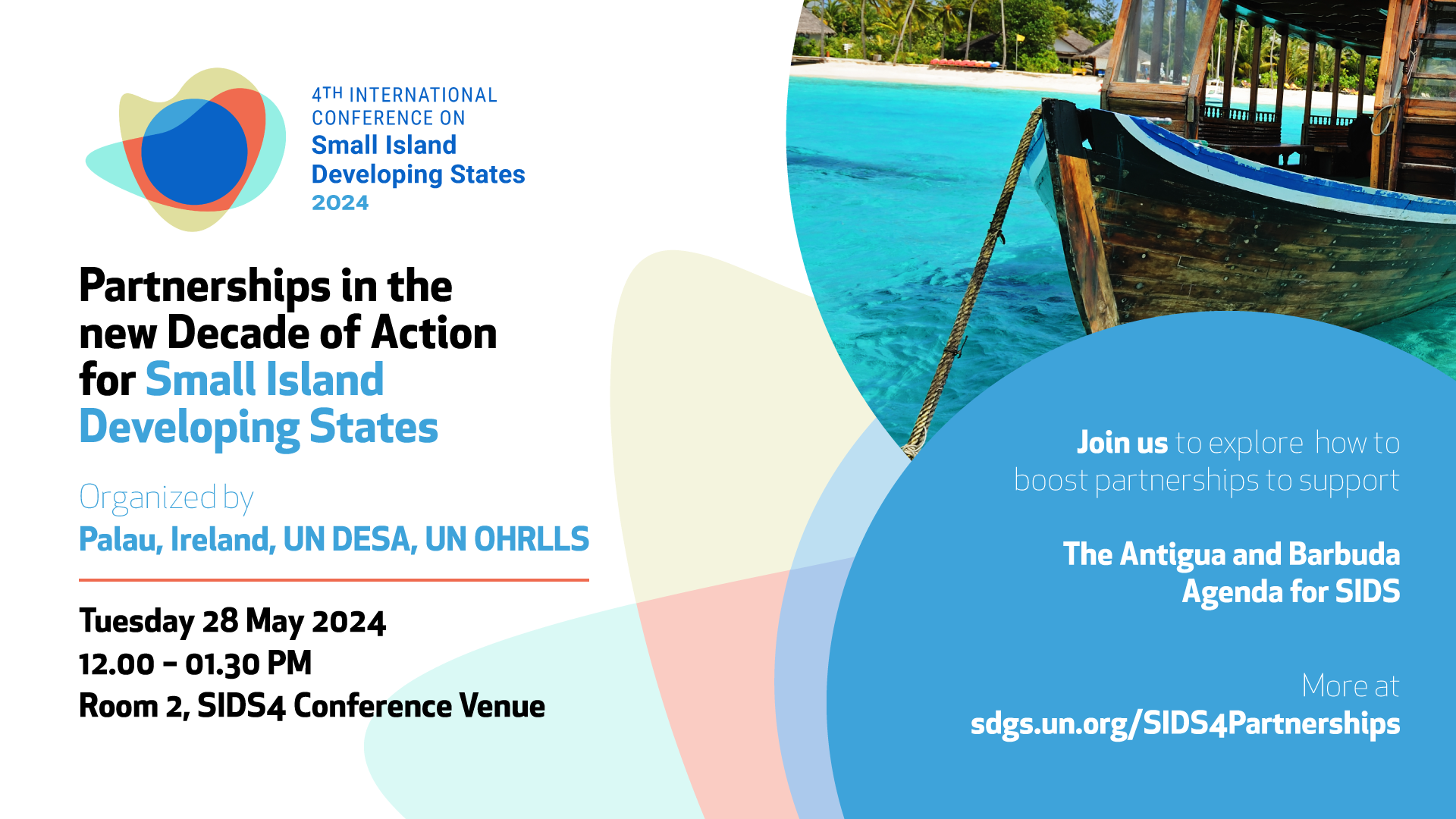Background

Multi-stakeholder partnerships play a crucial role in advancing sustainable development in Small Island Developing States (SIDS). By bringing together diverse stakeholders from various sectors, these collaborations can leverage their resources to address complex challenges, foster innovation, engage local communities, and catalyze transformative change toward shared prosperity and sustainability. The significance of such partnerships cannot be overstated, particularly in achieving the priorities outlined in the Antigua and Barbuda Agenda for SIDS (ABAS).
A significant outcome of the third International Conference on SIDS in 2014 was the establishment of the SIDS Partnership Framework. The Framework, initiated in 2015, serves as a mechanism to promote, monitor, and stimulate the formation of new partnerships for SIDS. Over time, it has evolved into a comprehensive multi-stakeholder platform, providing a space for reviewing the progress of SIDS partnerships and facilitating the exchange of best practices and lessons learned among stakeholders.
The outcome document of the fourth International Conference on Small Island Developing States (SIDS4) - The Antigua and Barbuda Agenda for SIDS (ABAS) – includes a request to the UN Secretary-General, in consultation with States and the Steering Committee on SIDS Partnerships, to present recommendations for the strengthening the SIDS Partnership Framework.
The United Nations Department of Economic and Social Affairs (UN DESA), with financial support from the Government of Portugal, has prepared a series of preliminary strategies for bolstering the SIDS Partnership Framework, aiming to inform ongoing discussions. The strategies encompass six critical areas: awareness and advocacy; inclusivity and strong engagement of all stakeholders; policies and a thriving enabling environment supportive of collaboration; capacity building and knowledge sharing; mechanisms to catalyze collaborations; and an effective UN and support structures to bolster efforts.
The side event will also provide an opportunity to gather insights from stakeholders on bolstering the Framework, as well as to explore the critical role multi-stakeholder partnerships will play in driving the implementation of ABAS.
Programme
12.00 PM – 12.20 PM
Opening segment
- H.E. Ms. IIana Seid, Permanent Representative of the Republic of Palau to the United Nations, co-chair of the Steering Committee on Partnerships for SIDS
- H.E. Mr. Fergal Mythen, Permanent Representative of Ireland to the United Nations, co-chair of the Steering Committee on Partnerships for SIDS
- Mr. Li Junhua, Under-Secretary-General for Economic and Social Affairs and Secretary-General of the SIDS4 Conference,
- Ms. Rabab Fatima, Under-Secretary-General and High Representative for the Least Developed Countries, Landlocked Developing Countries and Small Island Developing States
12.20 PM – 12.40 PM
Kick-off presentations
- Preliminary strategies for SIDS Partnership Framework for Action - Mr. Sai Navoti, Chief, SIDS Unit, Division for SDGs, UN DESA
- The role of SIDS Global Business Network in leveraging private sector partnerships - Ms. Tishka Francis, UN OHRLLS
12.40 PM – 01.25 PM
Panel discussion - Partnerships in the new Decade of Action for SIDS
Panelists:
- Government of Antigua and Barbuda / role of SIDS Center of Excellence (tbc)
- H.E. Ms. Ana Paula Fernandes, President, Camões, I.P, Government of Portugal
- Ms. Nickie Myers, Alligator Head Foundation, a representative of the winning partnership of 2023 SIDS Partnership Awards (Alliances for a bluer, greener Caribbean (Ridge to Reef))
- Ms. Jodi Smith, Matanataki Pte Ltd
- Ms. Emeline Siale Ilolahia, the Pacific Islands Association of Non-Governmental Organization (PIANGO) - role of SIDS Civil Society Action Plan and Roadmap
- Ms. Karuna Rana, SIDS Youth AIS Hub
Moderated by Mr. Darian Stibbe, The Partnering Initiative
Guiding questions
- How can multi-stakeholder partnerships be leveraged to support effective implementation of ABAS and what role can the SIDS Partnership Framework play in this regard?
- What policies and incentives are needed at the global, regional and national levels for fostering partnership formation in SIDS?
- How could the Global Multi-stakeholder Partnership Dialogue of the General Assembly be effectively harnessed to prioritize implementation of ABAS and deepen engagement and impact?
- How can the SIDS Partnership Framework effectively integrate and amplify the voices and perspectives of various stakeholders to ensure inclusivity and effectiveness in ABAS implementation?
01.25 – 01.30 PM
Closing and next steps

